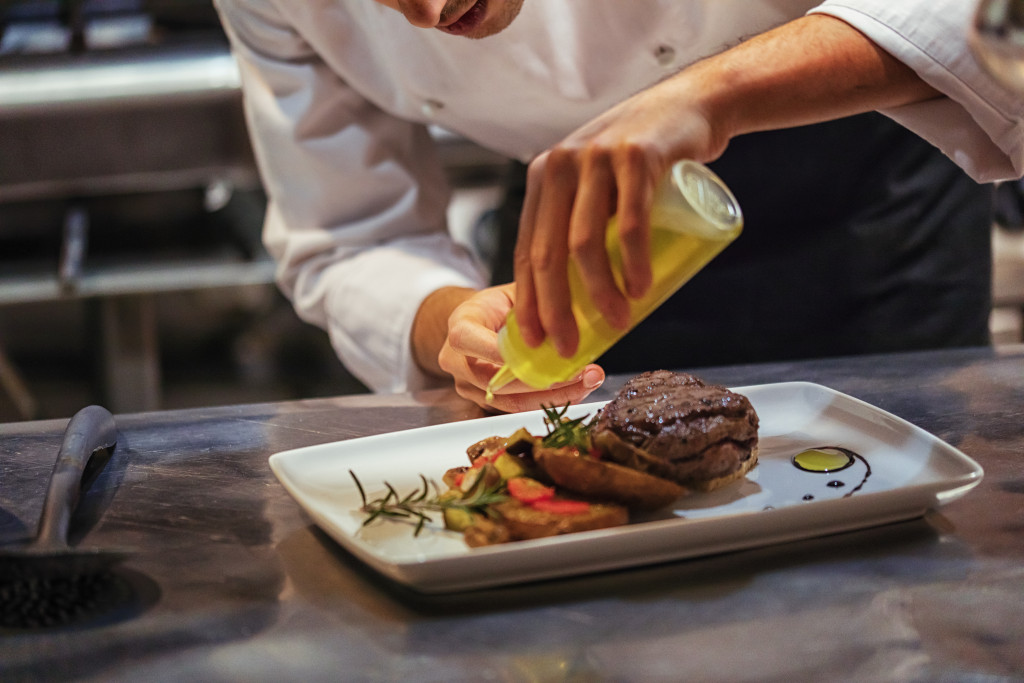- Invest time in market research to understand customer preferences and analyze your competition.
- Familiarize yourself with health, safety, and licensing laws and make sure your facility meets hygiene standards.
- Draft a detailed business plan outlining startup costs, operational expenses, and projected revenue.
- Leverage technological solutions for digital reservation systems, online ordering and delivery services, social media marketing, and data analytics.
- Invest in a high-quality overflow filling machine to ensure consistent product quality at high volumes.
Embarking on a journey in the food and beverage industry can be exhilarating. You can turn your culinary dreams into reality with passion, planning, and perseverance. However, establishing a business in this sector comes with unique challenges. With so many components to consider, from ingredients sourcing to marketing, it’s crucial to equip yourself with sound strategies right from the outset. Dive into these expert tips to set your venture on the path to success:
1. Research and Understand Your Market
Understanding your target audience is paramount in the vast food and beverage landscape.
Before you delve deep, invest time in market research. Identify your potential customers and understand their preferences, dietary needs, and spending habits. Are they looking for vegan options? Do they prefer organic, local ingredients? Or are they driven by convenience and quick service? Tailoring your offerings to meet specific demands can make your business stand out.
Furthermore, analyze your competition. What are the successful businesses doing right? Where are the gaps in the market? Gleaning these insights can shape your business model and give you a competitive edge.
2. Ensure Compliance with Health and Safety Regulations

A sterling reputation is built on consistent quality and safety.
A myriad of regulations govern the food and beverage industry. Familiarize yourself with local health, safety, and licensing laws. Ensure that your facility maintains the highest hygiene standards and undergoes regular inspections. Staff training in proper food handling and storage is non-negotiable.
Moreover, securing the necessary licenses and permits upfront will save you from potential legal hurdles. Staying compliant safeguards your business’s reputation and instills trust in your customers.
3. Plan Your Finances Wisely
Financial acumen is as essential as your culinary skills in this industry.
Draft a detailed business plan outlining your startup costs, operational expenses, and projected revenue. This will help you secure loans, attract investors, and guide your financial decisions as you grow.
Monitor your cash flow diligently. The food and beverage sector often grapples with fluctuating prices of ingredients, seasonality, and changing consumer trends. Having a buffer for lean periods and understanding your profit margins can steer your business through challenging times.
4. Embrace Technology and Innovation
Staying abreast of technological advancements can amplify your business’s efficiency and outreach. Embracing technology can not only enhance customer experience but also streamline your operations.
Here are some technologies to incorporate:
Digital Reservation and Delivery Systems
In the digital age, convenience is king. Implementing a digital reservation system can ensure smoother operations and improved customer experience. Online reservations allow customers to book a table with a click, saving them time and hassle. Similarly, offering online ordering and delivery services can significantly expand your customer base. By partnering with popular food delivery platforms or developing an app, you can tap into the segment of customers who prefer dining in the comfort of their homes.
Social Media and Online Marketing

Social media platforms are potent tools for food and beverage businesses. They provide a space to showcase your offerings through appealing visuals and engaging content. Regularly update your profiles with mouth-watering photos, promotional offers, and customer testimonials to attract followers. Additionally, leverage search engine optimization (SEO) to enhance your visibility online. Remember, a strong online presence can influence potential customers and drive traffic to your business.
Smart Kitchen Technologies
Smart kitchen technologies can revolutionize your operations, increasing efficiency and reducing waste. Tools like automated inventory management systems keep track of stock levels, alerting you when to reorder supplies, thereby preventing overstocking or shortages. Similarly, energy-efficient equipment can reduce utility bills while being environmentally friendly. For better performance, consider investing in smart appliances with pre-set cooking modes and energy-saving features.
Data Analytics and AI
Data-driven decisions can significantly enhance your business strategy. Harness the power of data analytics to gain insights into customer behavior, popular menu items, peak hours, and more to optimize your offerings and operations. Furthermore, artificial intelligence (AI) can automate various processes such as customer service (through chatbots), order management, and even trend predictions. In the long run, these technologies can help you stay ahead of the curve in the ever-competitive food and beverage industry.
5. Optimize Your Production Line
Ensuring consistent product quality at high volumes can be challenging in the beverage segment.
This is where investing in a high-quality overflow filling machine comes into significance. This machine can be a game-changer, especially if you’re venturing into liquid products like juices, sauces, or drinks. The overflow filling machine ensures each bottle is filled to the same level, giving your product a uniform, professional look. It’s efficient, accurate, and can handle a range of viscosities, ensuring you maintain consistent output without compromising quality.
Investing in high-quality machinery like this can boost production efficiency, reduce wastage, and enhance product appeal. Remember, the initial investment in reliable equipment often translates to long-term savings and consistent product quality.
In Closing
Launching a food and beverage business is a journey flavored with excitement, challenges, and immense potential. By thoroughly researching your market, ensuring compliance, managing finances, harnessing technology, and investing in efficient machinery, you’re setting the stage for a thriving venture. As you stir passion with practicality, your dream of serving delightful delicacies and beverages to a satisfied clientele can deliciously come to life.





